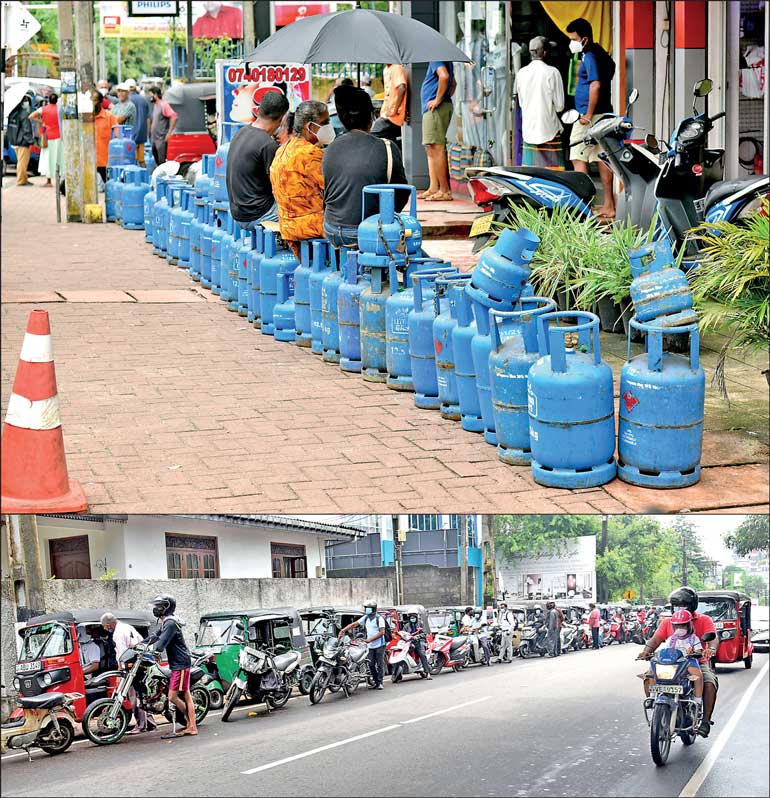Sunday Feb 15, 2026
Sunday Feb 15, 2026
Wednesday, 15 June 2022 00:20 - - {{hitsCtrl.values.hits}}

Next time you are in a queue for essentials, or don’t find your favourite quality brand on the shelves, know that it happened because you protested about the price of essentials and blamed it on the Government - Pix by Ruwan Walpola
While corruption is certainly a grave frustration and we should always fight to eradicate it, corruption is not what brought Sri Lanka to its knees.
brought Sri Lanka to its knees.
My opinion on this matter is not quite in tone with the ongoing protests in the country and will perhaps be unpopular. However, it is my fervent hope that these thoughts would spark debate around better economic management. That Sri Lanka and many other countries similar to us, would learn from these mistakes in charting out a path for a future that seems ever so uncertain.
What Sri Lanka faces is a four-pronged crisis of economic mismanagement. It is a system that needs to be changed, not just the people
1) Left-wing handouts coupled with capitalist tax policy:
Sri Lanka has long suffered from a bloated public sector (10% of working population) and heavy subsidies on the one end while following one of the lowest tax regimes in the world (8% of GDP). This is not a creation necessarily of the current government – but barring a couple of years under FM Mangala Samaraweera, it has been a persistent race to the bottom, regardless of the party in power.
While I’m firmly capitalist in approach, I’m not arguing for economic policy here. However, whichever approach the country chooses, we need to stick to one (wider social net + high taxes OR low taxes but reduced government support). We cannot have the best of both worlds. This is how our Debt/GDP got to 110%.
Where did all this money go? Into your pocket my friend.
Next time you travel on a highway, enjoy electricity or pump petrol at lower than cost, remember that you haven’t paid for any of these. These SOEs may certainly be affected by some level of mismanagement, but 80-90% of the losses are borne due to product mis-pricing (i.e. subsidies). You’ve enjoyed these resources without paying for them. In fact, the only things that you’ve paid for from your taxes are the interest on the Government’s loans and public sector salaries. Once these are done, there is none left over for anything else.
We have been living beyond our means for ages and we’ve done nothing about it except voting for the party which promises to raise salaries further or to cut taxes at the next election
2) Money printing central banks:
Multiple central bank administrations over the past 50 years have printed money to fund government budget deficits (driven by the above mismatch). Printing money is not necessarily bad if it is matched by productivity growth. In the absence of it or the lack thereof, printed money drives either inflation or currency devaluation.
While this has been highlighted in the current crisis (with an unfounded belief in a crazy new theory called Modern Monetary Theory), the reality is that it has happened for half a century now. This is why the LKR/USD has depreciated from 10:1 to 350:1 today over the past 50 years. This excess of printed money has more often than not kept borrowing rates too low for too long, resulting in long-term structural imbalances. Of course, the extent of the printing over the past two years has been second to none!
Where did all this money go? Into your pocket my friend.
Remember the loan you got at 7% to build your house? The bonus you got last year because your company performed well? The refrigerator you bought on an interest-free credit card scheme. A lot of that is cheap money which shouldn’t have existed. Yes, you benefited from it, but we also got poorer because of it.
3) Mercantilist theory trumping structural reforms:
Mercantilists have long advocated for import substitution as the only way to promote long-term economic growth. In reality, exports and imports only affect currency in the very short term. 80-90% of currency movement is actually explained by just one factor, money supply. The change in USD supply globally vs. the change in LKR supply adjusted for economic growth.
Firstly, exports are not necessarily a good thing, although they are portrayed as such. Exports in fact impoverish a country’s citizens and take away goods that they could otherwise consume. Exports are only justifiable if you are able to earn money for this sacrifice and are able to import something else you like. Secondly, free markets work on the principle of comparative advantage. You produce what you are best at and import everything else. This maximises efficiency and profit potential for everybody.
Mercantilists would like for you to believe that importing something affects the value of the currency. Central banks, misguided by these same beliefs have long tried to stop currency pressure by banning the import of cars, gold and many other ‘luxury items’. You can see for yourself its effect on the value of imports in just the past 12 months. On the contrary, take out 10% of the money supply, raise borrowing rates and then test for the same outcome. You will notice which variable actually affects currency.
By propagating this belief system, import substitution activities have long enjoyed huge barriers to entry and have earned supernormal profits at the expense of the common man. Free trade agreements have been scuttled on the premise that Sri Lankans would lose out to competitors overseas. Yet, countries like Singapore and UAE thrive despite there being no obvious competitive advantage for either of them.
Where did all this money go? Into the pockets of a select few local businessmen.
Next time you pay 50% higher prices for construction materials, sanitary napkins, shoes, cars and tyres, remember you are the loser from it. Your quality of life suffers from it.
As long as our markets remain closed, we cannot punch beyond the weight of a mere 22 million people. Where does growth come from in a country with an ageing population almost in decline and a land extent of 65,000 sq. km? Only by integrating with the rest of the world.
4)‘Control the price of everything’:
Sri Lanka has at many times suffered from delusional administrators who believe that the market does not know what is best. In-so doing, in the guise of protecting the small-man, they have sunk entire periods of the economy.
Is there pressure on the rupee? Peg it artificially. Is the price of hoppers too high? Place a cap price. Is the price of medicine too high? Place a cap on that too. Administrators both in government and in the central bank have long suffered from an inherent belief that one can control the market. Basic economic theory posits that when met with controlled price, supply will reduce drastically. Available supply will find its way into a black market and be sold at a price higher than even equilibrium. The same small-man is then stuck with a substandard product which is hard to come by and most likely found only in a Sathosa care-package.
We have seen this recently with the queues for most essential items and even in the shortage of USD.
Where did all this money go? The savings went into your pockets. The profits into the pockets of an enterprising few who benefited from arbitrage pricing.
Next time you are in a queue for essentials, or don’t find your favourite quality brand on the shelves, know that it happened because you protested about the price of essentials and blamed it on the Government.
Yes, Sri Lanka has had and has continued to have corrupt politicians. Yes, we should fight to send them all home and I fervently hope this is the moment it happens. But on the scale of cause and effect, the greater crisis we face is a crisis of economic mismanagement. In fact I would place the effects of bad economic management at many times the cost of all money ever stolen by politicians.
Where did all the money go? Yes, some of it is in the hands of politicians. Corruption – weed it out for sure. But most of it went into your pockets my friend. The only way for us to get out of this crisis, to beat the middle income trap, is to stop stealing from ourselves.
Successive administrations have fallen victim to this four-pronged fallacy. We the people are largely to blame for it, because we have enjoyed its fruits while not demanding honesty and accountability.
Demand governance, demand free markets, demand a change in the system.
(The writer is the Managing Director, Global Markets and Investment Banking at CAL.)